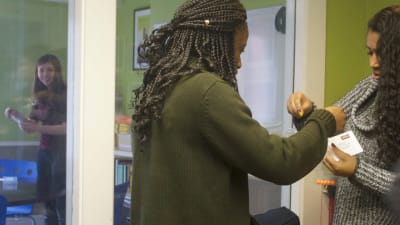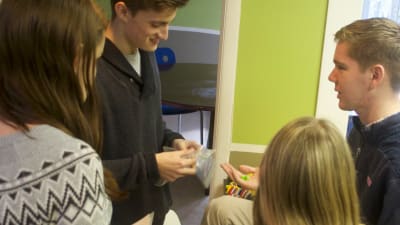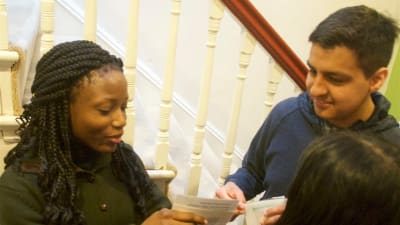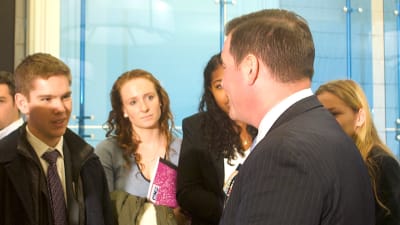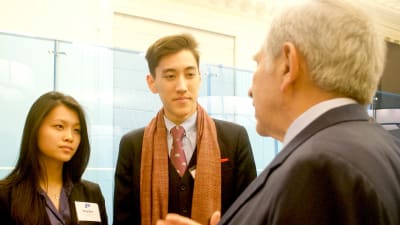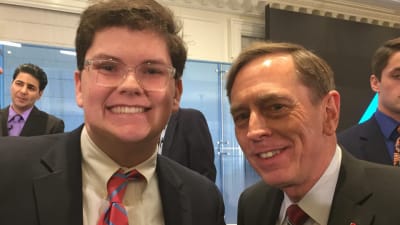Skittles, the Supreme Court, and Security: Week One
Keeping pace with a new Presidential Administration can be a challenge, especially in one’s first week in DC. With some help from their Ethics and Leadership course, our Spring 2017 students are doing just that.
We began the week with some ethical groundwork: The Infamous Skittles Scenario is the first stage of our “Introduction to Ethical Decision Making” case study (and an early SEGL rite-of-passage!). The interactive state-of-nature simulation has students chasing after plastic bags of candy and shouting with delight or dismay at 3×5 “Chance” cards. (What would you do if there were no rules and limited resources? Would you use that gun you found? Help out a suddenly-blind friend? Lie? Join a makeshift band of marauders? Form a “sharing collective” that might turn sour if resources are light?) The conversation that followed was both energetic and reflective.
We then gave the students an introduction to classic Western ethical theory–Aristotle, Kant, and John Stuart Mill–a 20-minute lecture that provides three important tools for their ethical decision making tool kit. (If you would like to see a seven-minute video of this lecture that was made for our online class several years ago, click here.)
On Wednesday, the morning after President Trump nominated Judge Neil Gorsuch to the Supreme Court, our students met with longtime SEGL favorite Clark Neily, a noted Supreme Court attorney, law professor, and libertarian public interest lawyer. Neily is most famous for representing the plaintiffs in DC v. Heller, the landmark 2008 case that established an individual’s Second Amendment right to bear arms. In addition to his remarks about the Heller case, Neily spoke about the legality of Trump’s Executive Orders, libertarian philosophy, and the U.S. Federal court system. One of his more memorable ideas: no one can reasonably claim to know “the Truth” 100% of the time, but that doesn’t mean we cannot get closer to it through rigorous examination of our arguments and assumptions.
Neily’s talk also helped prep our students for their next destination: DC’s Tony-winning Arena Stage, where they saw the world premiere production of Roe, a play about the landmark Supreme Court case Roe v. Wade. The performance, which attempted to share both sides of the abortion debate, raised eyebrows and countless ethical questions (in fact, the play had been altered in the last several days to reflect recent current events), and students asked questions during a special Q and A afterwards with the actors.
On Friday, the students walked a block down 18th Street to the American Enterprise Institute to confront another difficult ethical dilemma. AEI, a well-known conservative think tank, brought together former Deputy Secretary of Defense Paul Wolfowitz, retired four-star general and former CIA Director General David Petraeus, and two translators–Janis Shinwari, from Afghanistan, and Salwan Al Toki, from Iraq–who assisted the U.S. military during the conflicts in their countries. The event also featured Captain Matthew Zeller, founder and CEO of No One Left Behind.
According to the event description:
*Local translators in Iraq and Afghanistan play an instrumental role in helping the US military achieve its objectives, often at great risk to themselves and their families. Although programs such as the Special Immigrant Visa provide pathways to the US for local translators facing security threats, many still find themselves in their home countries, targeted by extremists for their work. How does protecting local national translators advance US national security? What can be done to ensure their safety after combat operations end? *(More about the event, including complete video coverage, is available here.)
Of course, the packed event had greater meaning given the controversy over the Trump Administration’s recent Executive Order temporarily barring refugees from seven Middle Eastern countries. In fact, one of the first refugees detained (and later released) at an airport last weekend was an Iraqi translator who had assisted the U.S. military. Some U.S. government officials are now rushing to have translators exempted from the Order.
The event had many additional ethical layers: Wolfowitz, for example, is considered one of the main architects of the controversial U.S. conflict in Iraq, Zeller says Shinwari saved his life in Afghanistan, and Petraeus’ 2012 resignation (after an affair with his biographer) created an ethics stir.
After the discussion, many SEGL students were able to engage one-on-one with the participants, asking follow-up questions (and posing for a few pictures) and continuing the discourse.
We’ve also included a few photos from our first English class in Dupont Circle. The students are writing in journals that will help them reflect on and document what is sure to be a memorable term in our nation’s capital.
Next up: our study of the 1994 Rwandan genocide.

